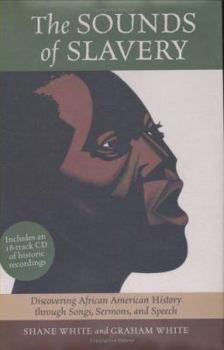The Sounds of Slavery: Discover African American History Through Songs, Sermons, and Speech
Select Format
Select Condition 
Book Overview
This exploration of African American slavery through sound is a groundbreaking way of understanding both slave culture and American history "A work of great originality and insight." -Ira Berlin... This description may be from another edition of this product.
Format:Hardcover
Language:English
ISBN:0807050261
ISBN13:9780807050262
Release Date:January 2005
Publisher:Beacon Press (MA)
Length:241 Pages
Weight:1.20 lbs.
Dimensions:1.1" x 6.3" x 9.5"
Customer Reviews
2 ratings
A good book that is much more than it seems to be
Published by Thriftbooks.com User , 18 years ago
White and White provide a great and useful book not only about slavery, but about African American culture as it emerged, developed itself and extended itself during the years of bondage. Using sound as their guide, they explore not just music, but speech, not just speech, but cries of agony and protest, about the noise instruments, dance, work, love, and death bring. As such they provide many explanations of how the variety of African cultures contributed to the growth of African American culture, how that culture has enabled us to survive, thrive, and contribute mightily the African, North American, and world culture. This is a useful and practical book. As I type, I am in the home of a friend who is an accomplished jazz and blues singer who is working out a blues to sing at a memorial meeting for the songwriter who wrote it. Serious stuff. The ideas about the nature of African American expression in general, musical and vocal expression in particular, and even what we do when people pass here, animate both the ideas that come to me, to her, and her sister, and memories on how to do this both from musical sources and our grandparents. This is that kind of book. The level of scholarship here is excellent. Everything is noted well, as such it provides an entryway to folks looking to get into serious sources on African American history, culture, and life. I like the fact that they refer to the 1930s WPA interviews with survivors of slavery as the "ex-slave" interviews instead of slave narratives as others do. Finally, as a writer myself, I am completely bowled over by their ability to present such a full exposition of these questions, clear in the issues of Black studies, cultural studies, music, and the growing discourse of "everyday life," while using clear and vibrant language. You need not be a scholar or have a dictionary handy to read it and understand it. It is a compelling book that I could not put down and finished the day I started it. I know I will read it again and again. The book comes with an 18-track CD of source material chiefly taken from 1930s recordings by Lomax and other folklorists, although there is some material from as late as the 1970s. The CD focuses on aspects of African American folk expression that are usually not known to those who claim to be knowledgeable of African American culture: field hollars, sermons, work songs. I emphasize that this book is not just about music, but about African American being and life. I emphasize that this book pictures the horror and devastation of slavery and our resistance and triumph of it, but illustrates what and how we do things now. If you can't buy this book, get one from the library and save your money until you can have one of your own.
A fascinating soundscape
Published by Thriftbooks.com User , 19 years ago
In West African tradition, sound making is functional, part and parcel of daily life, integral to most activities: working, celebrating, praying, mourning, placating, criticizing or just passing time. It's a tradition that was carried to the New World on slave ships, a tradition which enthralled, amused, repelled or even terrified white listeners...often simultaneously. This book goes beyond the music created by enslaved Africans/African Americans (such as work songs and spirituals) to explore other forms of sound expression (including sermons, drumming, field hollers and storytelling) placed within a historical context to create a soundscape of African American slave life from the 1700's to the 1850's. The written sources generally fall into two broad categories: the written observations of whites (letters, journal entries, and newspaper articles by travelers, missionaries, even slave owners themselves) and the testimony of former slaves collected by the WPA Federal Writer's Project during the 1930's. With only three exceptions, the sound sources on the 18-track CD are field recordings by John, Ruby and/or Alan Lomax from the late 1930's. By that point, the sounds had been "tainted" by pop culture (many are the times I have tracked down one of my father's rural childhood favorites from the 1920's, only to discover that this "old folk song" his grandma sang was actually an 1890's parlor tune) but alas, this is as close as we're going to get to listening in on a time which preceded sound reproduction devices. And as there are few things more frustrating than trying to understand sound by reading about it, the CD alone would be worth the price of the book. The book is written in a nonlinear style, perhaps reflecting the subject matter which is itself quilt-like: slaves were constantly creating and recreating from the sound materials at hand, materials which often were not even recognized as such by white listeners. This nonlinear style could make the book a bit difficult to use for reference purposes, but fortunately it is well indexed. This fascinating soundscape is recommended for anyone interested in African American music in general, or the era of slavery in particular.





